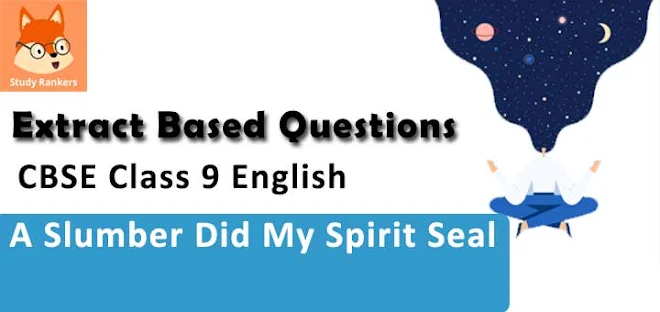Extract Based Question for A Slumber Did My Spirit Seal Class 9 English Beehive with Solutions
Extract based questions for the poem A Slumber Did My Spirit Seal has been prepared by our expert teachers. Students can read and learn from these questions and these are very important in their examination. Class 9 English Beehive poem A Slumber Did My Spirit Seal extract based questions are very helpful in understanding the chapter. It also help in the revision. Students can rely on these questions and answers taken from the extract of chapter A Slumber Did My Spirit Seal poem to get good marks in their English Paper.

A Slumber Did My Spirit Seal Line by Line Explanation Class 9 English
Stanza 1
"A slumber did my spirit seal—
I had no human fears.
She seemed a thing that could not feel
The touch of earthly years."
Word Meanings:
- Slumber: Sleep
- Spirit: Soul, Mind
- Seal: Close off
- Fears: Doubts, Worries
- Touch: Effect
- Years: Passing of time
Explanation:
A deep sleep closed off my soul or mind. I had no fears that trouble common people. She seemed to me as one who was unaffected by the passing time. In other words, she (the poet's loved one) was, to him, ever-young and everlasting (immortal).
Stanza 2
"No motion has she now, no force—
She neither hear nor sees,
Rolled round in earth's diurnal course
With rocks and stones and trees."
Word Meanings:
- Motion: Movement of body parts
- Force: Vitality, Life
- Diurnal: Daily
- Course: Movement, Rotation of the earth on its axis
Explanation:
Her body has no movement. No part of her body has any motion. She neither hears nor sees. As she is buried under the surface of the earth, she goes around with the earth that rotates on its axis to bring about days and nights. It means that she has become a part of the earth just like rocks, stones and trees.
A Slumber Did My Spirit Seal Extract Based Question Class 9 English
Read the following extracts carefully and answer the questions that follow—Stanza 1 of A Slumber Did My Spirit Seal
I had no human fears.
She seemed a thing that could not feel
The touch of earthly years.
Question 1: What does the poet mean by "A Slumber Did My Spirit Seal"?
(a) a deep sleep sealed off his mental power to see the reality of life.
(b) his power to think was sealed off by a deep sleep.
(c) he lost the power to dream.
(d) None of the above.
Answer
(a) a deep sleep sealed off his mental power to see the reality of life.
Question 2: Which human fears does the poet talk about?
(a) the fears of ghosts, wild animals and natural calamities.
(b) the human fears of death, illness and starvation.
(c) the human fears of unknown events to come.
(d) None of the above.
Answer
(b) the human fears of death, illness and starvation.
Question 3: What did the poet feel about his loved one?
(a) He felt that his loved one would grow old and die.
(b) He felt that his loved one might be attacked by wild animals or be a victim of some natural calamity.
(c) He felt that his loved one was ageless and immortal.
(d) None of the above.
Answer
(c) He felt that his loved one was ageless and immortal.
Question 4: Which slumber is the poet talking about?
(a) the illusion he had about his loved one.
(b) the deep sleep he fell into after hard work.
(c) the state of intoxication he was in after consuming an excessive amount of liquor.
(d) None of the above.
Answer
(a) the illusion he had about his loved one.
Stanza 2 of A Slumber Did My Spirit Seal
No motion has she now, no force—
She neither hear nor sees,
Rolled round in earth's diurnal course
With rocks and stones and trees.
Question 1: What realization dawns on the poet?
(a) His loved one's body has no movement and no life.
(b) His loved one's body has become as hard as stones and trees.
(c) His loved one is not inclined to talk with him.
(d) None of the above.
Answer
(a) His loved one's body has no movement and no life.
Question 2: What shocks the poet?
(a) The indifference of the poet's loved one shocks the poet.
(b) The motionlessness of the poet's loved one's body shocks him.
(c) The realization that his beloved is not alive, shocks him.
(d) None of the above.
Answer
(c) The realization that his beloved is not alive, shocks him.
Question 3: Which words from the poem describe death?
(a) 'No motion', 'no force' and 'neither hears nor sees'.
(b) 'Rocks', 'stones' and 'trees'.
(c) `Rolled', diurnal' and 'course'.
(d) None of the above.
Answer
(a) 'No motion', 'no force' and 'neither hears nor sees'.
Question 4: Why does the poet compare his loved one to "rocks, stones, and trees"?
(a) Being now a part of the earth, the poet's loved one rotates with the earth as rocks, stones and trees do.
(b) She is buried among rocks, stones and trees.
(c) She is as senseless as rocks, stones and trees.
(d) None of the above.
Answer
(a) Being now a part of the earth, the poet's loved one rotates with the earth as rocks, stones and trees do.

